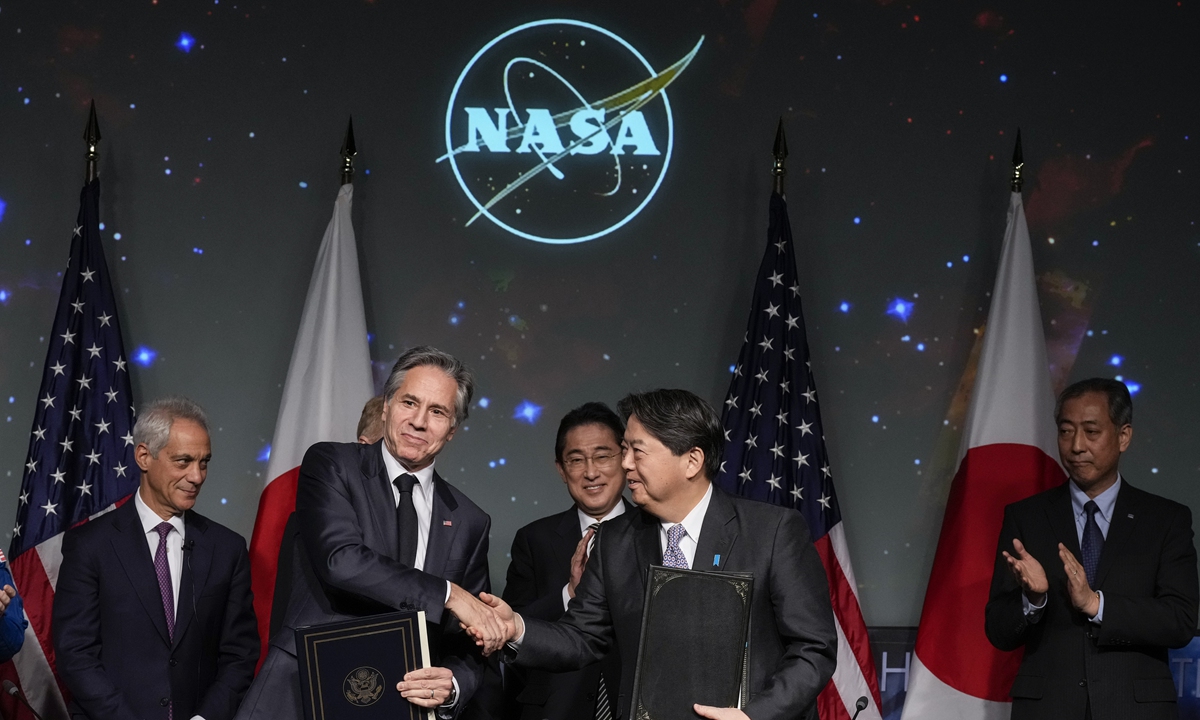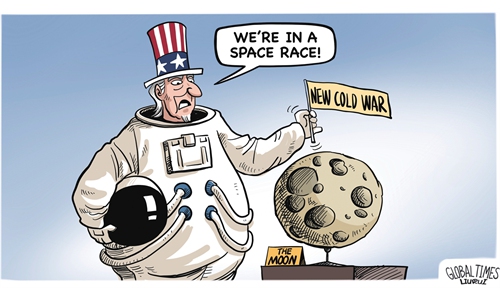
US Secretary of State Antony Blinken and Japanese Foreign Minister Yoshimasa Hayashi shake hands after signing the US-Japan Space Cooperation Framework Agreement at NASA headquarters January 13, 2023 in Washington, DC. Photo: VCG
Representatives from the US and Japan gathered at the US' NASA headquarters in Washington local time on Friday and signed an agreement that "builds on a long history of collaboration in space exploration between two nations."
However, the underlying anti-China color of the agreement is worryingly obvious, since it came just shortly after US Secretary of State Antony Blinken made remarks last week that the US and Japan agree China is their "greatest shared strategic challenge" and they confirmed that an attack in space would trigger a mutual defense provision in the US-Japan security treaty, Chinese observers warned.
The signing of the space cooperation framework agreement is described by NASA as a highlight of Prime Minister Fumio Kishida's visit to Washington, his first since taking office in 2021.
The crucial background to Kishida's visit is the Japanese Cabinet's passing of three key defense documents in December 2022, which include a substantial increase in defense expenditure and the determination to possess "counterstrike" capability. This marks Japan's largest military reform since World War II, observers said.
Blinken and Japan's Minister for Foreign Affairs Yoshimasa Hayashi signed the agreement on behalf of the two countries.
"I expect this agreement to vigorously promote Japan-US space cooperation and expand areas of cooperation for the Japan-US alliance, which is stronger than ever before," Kishida said.
Known as the "Framework Agreement Between the Government of Japan and the Government of the United States of America for Cooperation in Space Exploration and Use of Outer Space, Including the Moon and Other Celestial Bodies, For Peaceful Purposes," this pact recognizes a mutual interest in peaceful exploration, NASA claimed in a press release.
NASA said it and the Japanese government had finalized a previous agreement in November 2022 confirming Japan's contributions to the lunar Gateway orbiting outpost as part of a commitment to long-term lunar exploration cooperation with NASA under the Artemis program.
Japan was one of the earliest signatories of the US-proposed Artemis Accords, aiming to become the second country to land an astronaut on the moon as part of the project, which was widely criticized for its exclusiveness. Media has reported that the pact proposed building safety zones "surrounding future moon bases in a bid to prevent damage or interference from rival countries and companies." And only "like-minded space partners" were welcomed in signing in the US-led pact.
Japan and the US will accelerate sending the first Japanese astronaut to the moon, Kyodo News said, and the move is "intended to rival China, which is considering building a lunar research base."
"Together, we have advanced the frontiers of human endeavor and scientific knowledge through our partnership - from the creation of the International Space Station to development of the lunar Gateway, a research outpost that will orbit the Moon and be used to prepare for future missions to Mars," the US state department said in a press release over the signing of the new US-Japan space cooperation agreement.
The Wall Street Journal wrote on Wednesday that the US and Japan had announced initiatives to expand the alliance's security umbrella to safeguard Japanese satellites from attack, and the report cited US officials as saying that such an undertaking was previously only given to NATO allies.
Blinken said that any attacks "to, from and within space" on Japanese satellites could prompt the invocation of Article V of the US-Japan Security Treaty, the WSJ wrote, while spelling out that political agenda behind is to "counter China."
Song Zhongping, a space watcher and TV commentator, told the Global Times on Sunday warned that what lies behind Japan's increasing closeness with the US in the space domain is not only the ambition of becoming a space power with US technology assistance, but also the vicious goals of developing military forces of an offensive nature in space in the name of protecting space assets and gradually breaking through its Pacifist Constitution.
The US also needs help from Japan in technology as well as for the money. Experts noted that the Japan needs to understand that "the satellite protection the US offered demands real cash and such extra money would serve to ease the budget pressure the US is facing on its own in the rivalry against China and Russia."
Japan should avoid becoming a US lackey in space, and it should abandon the idea of playing the role of a "sharp spear" in the alliance as the US has given strong support for, as it would go against the post-war promises and hurt the delicate trust of its Asian neighbors, creating chaos and turbulence in the Asia-Pacific region, analysts said.

